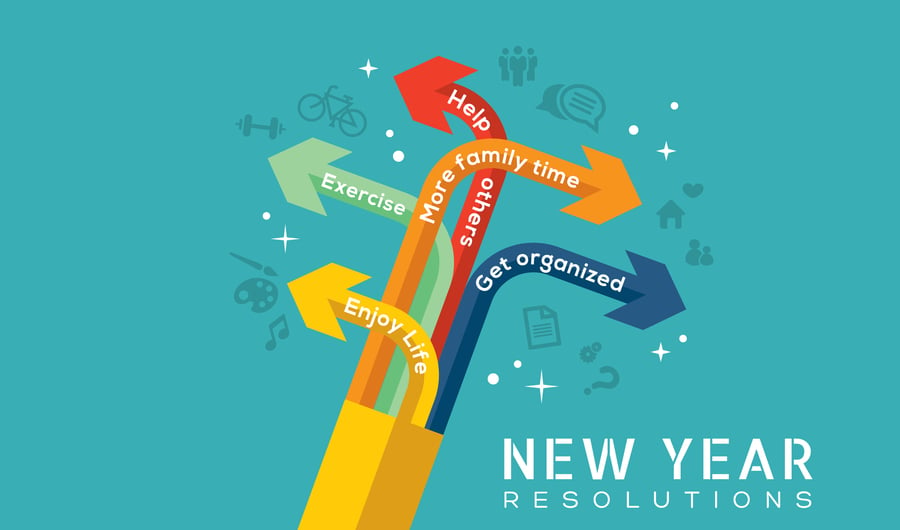 A New Year often brings fresh hope and excitement for the year ahead. It is a time where you get a moment to reflect on the year that has been and craft a vision for what you want the year ahead to look like. Whether you have been wanting to expand your business, start your own business, or use your time more effectively, it is important to consider what you can do to increase the likelihood of achieving your New Year’s Resolutions.
A New Year often brings fresh hope and excitement for the year ahead. It is a time where you get a moment to reflect on the year that has been and craft a vision for what you want the year ahead to look like. Whether you have been wanting to expand your business, start your own business, or use your time more effectively, it is important to consider what you can do to increase the likelihood of achieving your New Year’s Resolutions.
Confidence in achieving your New Year’s Resolutions doesn’t always translate to success. The University of Bristol conducted a study in 2007 which revealed that 88% of the participants involved in the study failed to achieve their New Year’s Resolutions. This number shocked me especially when I saw that 52% of participants in the study were confident that they would succeed. That said, I was surprised that of the 12% who did achieve their resolutions, weren’t confident. I want people to achieve their resolutions, so I’ve identified four obstacles that get in the way of this.
1/ Forget your old resolutions
Have you ever decided on your New Year’s resolutions only to realise they were the same resolutions you set the previous year? If you forget where you need to go it is almost impossible to get there. While Tony Robbins says that “setting goals is the first step in turning the invisible into the visible” forgetting your resolutions takes you back to the beginning of your journey. You will be much more likely to achieve your resolutions if you simply remember what they are. That way, you make decisions with your resolutions in mind. Write your resolutions down somewhere visible where you will see them often. Could be in your bedroom, toilet door, desk at work, or on your steering wheel in your car. Also consider writing your resolutions down daily or as Brian Tracy suggests try allocating the first part of your day to reflect on your resolutions.
2/ Don’t make too many resolutions
Having goals for the year is a good thing but if you have too many New Year’s resolutions your focus can be spread thinly. This can lead to frustration as we exert a lot of effort in a lot of different directions to find we have made minimal progress. A popular quote from Confucius highlights this perfectly:
“The man who chases two rabbits, catches neither.” - Confucius
If you find you have a lot of resolutions for the year and want to increase your chances of achieving them; focus your efforts on a few. Create a list of all your Resolutions and identify the top two or three which are the most important to you. Then put your effort into achieving those one. That way, by the end of the year you will have a better chance of catching a rabbit.
3/ Failing to keep track of progress
Measuring the progress, you have made is what stops your resolution to do list turning into a wish list. Peter Drucker put it this way:
“What isn’t measured isn’t managed”
By measuring your progress and seeing visibly how far you have come it can reduce the frustration that can emerge from a perceived lack of progress. Measuring your progress is important because it helps you to breakdown bigger resolutions into achievable chunks. By breaking your resolutions down, you are creating milestones which you can use to assess your progress against. For example, if you do not exercise but wanted to run a marathon in 2019 you might break it down to several to-do’s such as: run 1 kilometre uninterrupted, run 5 kilometres uninterrupted, complete a half marathon, run 30 kilometres uninterrupted, and finally run a marathon. Keeping track of your progress is a lot easier when you are specific which leads to the next roadblock.
4/ Don’t set unrealistic and unspecific resolutions
It can be tempting to have New Year’s resolutions that are really wishes like: owning an Island, being an NBA champion, or having superpowers. But when it comes to resolution setting sometimes things can get a bit blurry. Resolutions are a great way to strive to do something you have not previously done but at what point does a goal or Resolution become unrealistic?
If you are struggling to create realistic and specific resolutions use SMART goals or in this case SMART Resolutions. But what are SMART resolutions?

SMART resolutions are:
-
Specific: Exactly what are you trying to accomplish? Define exactly what your end result should look like.
-
Measurable: How will you measure success? What are your milestones along the way? Think percentages and numbers.
-
Attainable: Is your goal realistic? Can you achieve it without compromising other commitments?
-
Relevant: Does the goal fit with your business model?
-
Time-based: When do you plan to achieve it by? There’s nothing more de-motivating than a goal without a defined end.
Creating and recording SMART goals gives you a much greater chance of achieving your personal and professional resolutions.
As you set your New Year’s resolutions, let me leave you with this quote:
“Unless a commitment is made there are only promises and hopes but no plans” - Peter Drucker
Have you made your New Year’s Resolutions already? Let me know in the comments what you are going to achieve this year. I look forward to reading them.
All photos used in post are from Deposit Photos





